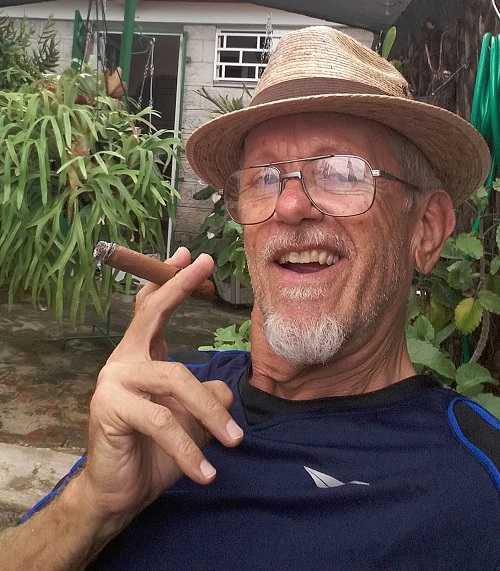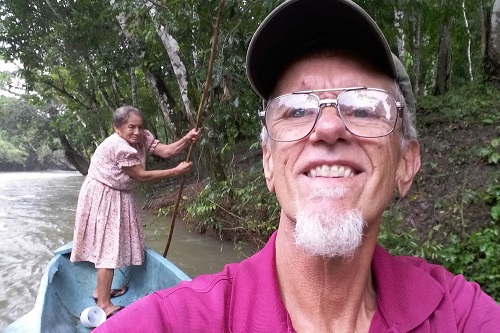Who are you?
David Hunter Bishop, born 1951 in Camden, New Jersey. I was raised in a working-class community on the Delaware River in Southern New Jersey, attended the United States Naval Academy and was graduated from Temple University with a degree in American Studies.After that I began a career in journalism that took me to jobs in California and Hawaii where my ex-wife and I raised two sons. I retired in Hawaii after 36 years there as a local newspaper reporter and editor, labor activist, political aide and environmental manager.
Where, when and why did you move abroad?
When I was 63, in my recliner watching YouTube travel videos, I was fascinated by one about an animal market in Guatemala.
I thought, “Geez, if I were traveling, that’s the kind of thing I’d like to see.”
Which is when the thunderbolt struck. I was healthy, I had the time and some income. My marriage had fallen apart, the kids were grown and on their own, and I was just cutting grass, doing chores, playing golf and falling asleep in front of the TV.
“Why the hell am I NOT traveling?!”
All of a sudden I was motivated, excited again. I spent the next eight months getting in shape, planning, and settling my affairs. On August 1, 2016, I set out, landing first in Antigua, Guatemala, where I enrolled in a Spanish language school and signed up for a home stay.
Since then I’ve traveled in Guatemala, Mexico, Belize, Cuba and now Colombia, and I’ve never looked back. I’m more energetic and enthusiastic than ever, always looking forward to my next new expat adventure.
Over the course of a year I’ve adopted philosophies on the road that have changed my life, restored my confidence, given me peace of mind, brightened my outlook on the world and broadened my relationships with the people who inhabit it.
Even in my post-retirement years, I’ve found I could move to the rhythm of the global beat without fear of the years bearing down on my course. I’m inspired by many authors and philosophers, including the late martial artist Bruce Lee, who said: “All things move to live, and the more they move, the stronger they get.”
What challenges did you face during the move?
I’m hard put to come up with challenges because almost everything seemed to fall into place for me. I just proceeded in an orderly and deliberate fashion to sell almost everything I owned and make sure I left no loose ends in terms of finances and paperwork. However I can tell you the most difficult part was leaving my two dogs behind. I could explain to friends and family what I was doing, but I couldn’t make my canine friends understand. In their dog wisdom and intuition they knew what was happening, and the younger one tried to undermine my attempts to pack and prepare at every turn, stealing stuff and chewing up my guide books and papers whenever he could seize the opportunity. It is difficult still to realize how much I miss my dogs. They are well cared for by my son in the same great environment they grew up in, I know, and now I enjoy making friends with the dogs I meet wherever I go, but I still miss dearly the two I raised from pups and left in Hawaii. That indeed has been a great challenge.
How did you find somewhere to live?
I’ve lived in homes, hostels, hotels and Airbnb rooms and generally have had the most success and satisfaction with Airbnb. Hotels are expensive and impersonal, hostels are better but with more mixed results, and home stays are OK though more difficult to arrange. Airbnbs are easy to manage and provide an instant local contact in your host who in my experience has often become a good long-term friend. Airbnbs are also inexpensive.
Are there many other expats in your area?
I’ve run the gamut from living in large expat communities in language-school communities such as Antigua, to cities like Culiacan, Mexico, one of my favorites, in which I thought I was the only gringo/American/expat among 800,000 residents. The more I’ve traveled the more I try to avoid the company of expats. Not because I don’t like them or that I’m not sociable, I just prefer immersion in the local culture and rather enjoy being the only foreigner in whatever locale I’m in. It keeps me out of the comfort zone that hinders a better and more complete understanding of the people, language and culture I’m visiting.
Here in Colombia, I’ve lived in Sabaneta, which seems to have a fair number of expats though they are not so visible a community as in, say, Poblado, and it’s easy to stay active almost exclusively with paisas (Colombian residents of Medellin, Antioquia). Conversely, since expats are indeed a large part of the local community that I’ve lived in for a while now, I will be attending a meetup of expats this week to learn more from their perspective.
What is your relationship like with the locals?
Excellent, and I am pleased to have a number of good long-term friends among the many non-expat people I’ve met. My language skills are still not where I’d like them to be so I am continually working on that, and I find my attempts to communicate in the native language foster a sense of appreciation among most of the locals that I encounter. I try to smile, be friendly and stay humble, and to maintain a sense of humor at all times which also helps me in my daily encounters with people in local businesses that I frequent. By maintaining a positive attitude they begin to notice and respond in a friendly manner. I always attempt to make eye contact with people in public situations and try to convey a sense of confidence in my presence wherever I go.

As a single person I have used online dating services to meet women and as a result have exclusively dated women who speak Spanish only, again forcing me into situations where I am fully immersed in the culture. By being honest with the women I meet this way, I am happy to say I have had good and satisfying relationships and made a number of good friends. Of course not all matches turn out well but that’s just the nature of any dating service.
What do you like about life where you are?
I like the sense of freedom that comes with being where I want to be, doing what I want to do, and learning more every day about a different culture, its people, and myself.
What do you dislike about your expat life?
Very little. There are practical concerns, of course, but they only get in the way of a great experience if you let them. Keep a broad perspective and let your mind sweep away the negatives and enjoy the positives to their fullest.
What is the biggest cultural difference you have experienced between your new country and life back home?
Obviously it is language. I enjoy stimulating and thought-provoking conversation and my inability to talk about issues and feelings in depth with Spanish-speaking people is something I am trying to overcome.
What do you think of the food and drink in your new country? What are your particular likes or dislikes?
The food and drink available in Colombia is good and diverse. There is a preponderance of fried foods, meat and refined-wheat products but it is easy enough to create a diet here that meets my needs, especially with the variety and availability of fresh fruits and vegetables. In other countries I’ve visited, Cuba and Belize for example, this was not always the case though I managed to meet my food needs to a large extent, though it caused me to become more adaptable to change and work with what I have. I find it counterproductive to complain about things like food and drink; I prefer simply accept a situation for what it is and make do. After all, you chose the country you’re visiting. Work with it or go somewhere else.
What advice would you give to anyone following in your footsteps?
Be forever humble and grateful for your opportunities to be with people in different cultures and countries and share their lives and experiences without expecting the world to conform to your notions of how things should be. Be friendly, courteous and helpful to others. It never hurts, and in the end it gains you a wealth of goodwill that you never knew you might acquire, and will work to your benefit in the long run.
Also I think it is important to be willing to take risks to satisfy your wanderlust to its fullest. You don’t have to accept every bit of negative advice you hear as gospel truth, especially when people or guidebooks advise you not to go somewhere or do something that seems intriguing to you as a traveler. Everyone has their own prejudices and biases. Think for yourself, take all advice graciously, then make your own evaluation and decision. Sometimes applying a bit of caution, common sense and positive determination to a potentially dodgy situation will allow you to do things that you may have been warned against. Some of my most rewarding travel experiences have come about this way.
What are your plans for the future?
Next I fly to Germany to visit my niece and sister-in-law in Berlin for a month. Then I will return to Medellin for a few weeks before heading out to explore more of South America on an overland adventure tour of several months or more – Ecuador, Brazil, Peru, Bolivia and who knows where else. Part of the beauty of my experience traveling is that I am able to change plans on a whim, so there is no set itinerary. Life is good that way.
You can keep up to date with David's adventures on Facebook.
Would you like to share your experience of life abroad with other readers? Answer the questions here to be featured in an interview!

